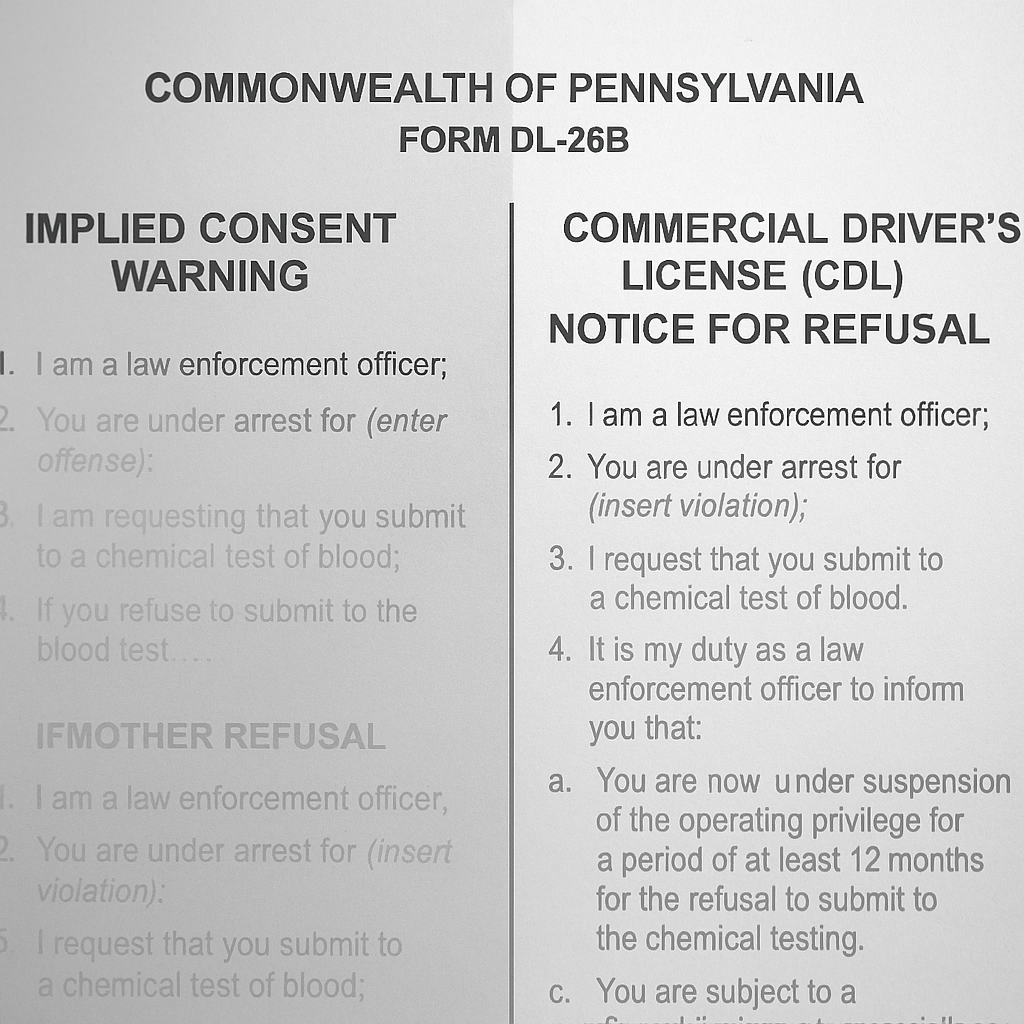Analysis of Bergenstock v. Department of Transportation: Commonwealth Court Reverses Lifetime CDL Disqualification Due to Inadequate Implied Consent Warnings
Aug. 24, 2025
On February 20, 2024, the Pennsylvania Commonwealth Court issued an opinion affirming an 18-month suspension of the appellant’s operating privileges but reversing a lifetime disqualification of his commercial driver’s license (CDL) under the Vehicle Code. The appellant, Joshua Bergenstock, challenged the trial court’s denial of his appeals from DOT’s actions following two consecutive DUI arrests and chemical test refusals. This precedential decision highlights the stringent requirements for implied consent warnings in CDL cases and provides critical guidance for practitioners handling DUI-related license suspensions. This article offers a detailed legal analysis of the opinion, its procedural history, substantive holdings, and practical implications for criminal defense attorneys.
Factual and Procedural Background
The case stems from events on July 30 and 31, 2022, in Milton, Pennsylvania. On July 30, Bergenstock was arrested for DUI and refused chemical testing. The following night, at approximately 12:51 a.m. on July 31, Corporal Daniel Zettelmoyer responded to a report of an intoxicated man in a running truck at Speedy’s Place bar parking lot. Zettelmoyer found Bergenstock slumped over in the driver’s seat of his black truck with the engine running, recognizing him from the prior night’s arrest. After assistance from Officer Noviello to rouse him, Bergenstock exhibited signs of intoxication, including a flushed face, bloodshot and glassy eyes, slurred speech, and an alcohol odor. He failed field sobriety tests and was arrested for DUI, then transported for a blood draw.
At the hospital, Zettelmoyer read only side one of Form DL-26B, warning of a 12- to 18-month operating privilege suspension for refusal but omitting side two’s CDL-specific warnings. Bergenstock refused testing. DOT issued an 18-month suspension under 75 Pa.C.S. § 1547(b)(1)(ii)(A) (second refusal) and a lifetime CDL disqualification under 75 Pa.C.S. § 1611(c) (two refusals from separate incidents). Bergenstock appealed both to the Northumberland County Court of Common Pleas, which consolidated them and denied relief after a de novo hearing where DOT presented Zettelmoyer’s testimony and documentary evidence. Bergenstock appealed to the Commonwealth Court, which heard arguments on December 4, 2023.
Legal Issue and Standard of Review
The primary issues were whether DOT proved reasonable grounds for the DUI arrest to support the 18-month suspension under § 1547, and whether the implied consent warnings were sufficient for the lifetime CDL disqualification under § 1611(c). These presented questions of law, reviewed de novo with a plenary scope. The court applied precedents like Banner v. Department of Transportation, 737 A.2d 1203 (Pa. 1999), for reasonable grounds, and analyzed the implied consent requirements under §§ 1547 and 1613, emphasizing the need for specific CDL warnings.
Statutory Analysis: 18-Month Suspension Under 75 Pa.C.S. § 1547
To sustain a suspension under § 1547, DOT must prove the licensee was arrested for DUI by an officer with reasonable grounds to believe operation or control while intoxicated, was asked to test, refused, and was warned of consequences. Reasonable grounds require viewing facts as they appeared to the officer, without needing correctness. Citing Banner, the court noted no bright line but held that a motorist in the driver’s seat with the engine running suffices, even in a parking lot (Gammer v. Department of Transportation, 995 A.2d 380 (Pa. Cmwlth. 2010)).
Here, Zettelmoyer had reasonable grounds: Bergenstock was slumped in the running truck, unresponsive initially, showed intoxication signs, and failed tests. His claim of not driving was immaterial (Bird v. Department of Transportation, 578 A.2d 1345 (Pa. Cmwlth. 1990)). The court affirmed the suspension, rejecting arguments that alternative explanations negated reasonable grounds.
Common Law Analysis and Applicability to Lifetime CDL Disqualification Under 75 Pa.C.S. § 1611
For the CDL disqualification, the court examined § 1613’s implied consent for commercial drivers, requiring warnings that refusal leads to disqualification. The officer must read CDL-specific warnings (Boseman v. Department of Transportation, 157 A.3d 10 (Pa. Cmwlth. 2017)). Zettelmoyer read only general warnings, omitting CDL consequences.
The court held that warnings must be sufficient for informed refusal. Since side two of DL-26B was not read, the refusal was not knowing for CDL purposes. DOT’s argument that general warnings sufficed was rejected, as § 1613 requires explicit CDL warnings. The court reversed the disqualification, emphasizing statutory compliance for enhanced penalties.
Conclusion and Precedential Status
The court affirmed the 18-month suspension but reversed the lifetime disqualification, remanding for reinstatement of Bergenstock’s CDL. As a published opinion, Bergenstock is precedential, binding on lower courts and offering authoritative guidance on implied consent warnings in CDL cases.
Implications for Practice
This decision underscores the importance of verifying implied consent warnings in DUI appeals involving CDLs. Practitioners should scrutinize Form DL-26B readings and challenge disqualifications lacking specific warnings. For non-CDL suspensions, it reaffirms broad reasonable grounds standards. In Philadelphia and beyond, where DUI arrests are common, this ruling aids in protecting commercial drivers’ livelihoods through targeted appeals or negotiations for ARD. Counsel must ensure officers comply with statutory mandates to avoid reversible errors.

 Bergenstock v. Commonwealth of Pennsylvania, Department of Transportation, Bureau of Driver Licensing, 69 C.D. 2023
Bergenstock v. Commonwealth of Pennsylvania, Department of Transportation, Bureau of Driver Licensing, 69 C.D. 2023